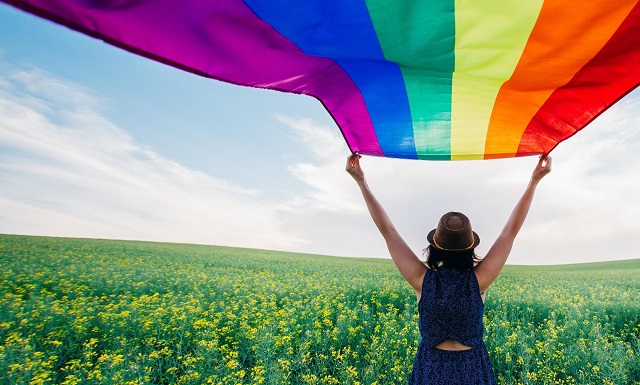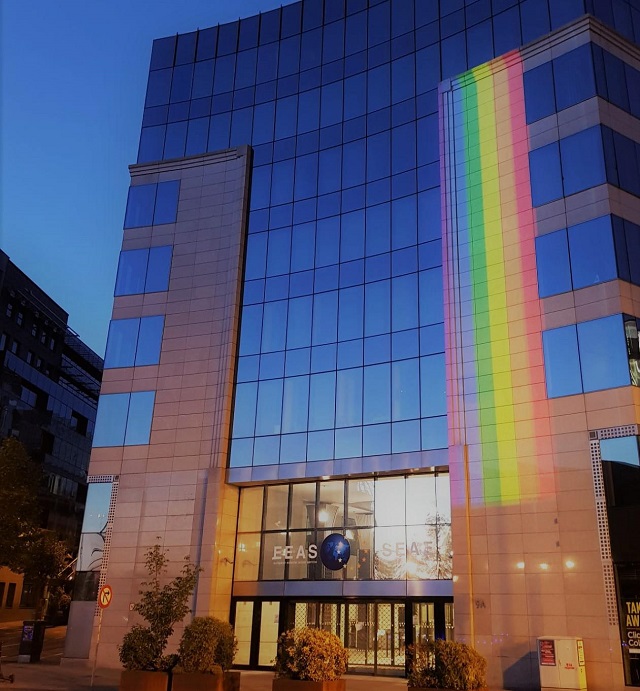As May 17 marks the International Day Against Homophobia, Transphobia and Biphobia, the European Union pays tribute to human diversity in all its richness, and the right of every human person to be proud of who they are, to define their own identity and to choose to be with the ones they love. Once again the EU buildings are lit up in rainbow colours. This year, this colourful icon of optimism is two-fold as it is also being used as a symbol of hope and support during the Covid-19 crisis, which has increased the vulnerability of LGBTI+ persons as victims of hostilities, including being forced to move back into unsafe domestic spaces.
“As the world is focused on efforts to contain the COVID-19 pandemic, we remember and highlight the particular challenges faced by lesbian, gay, bisexual, transgender and intersex (LGBTI) persons in many parts of the world. They often are confronted with stigma, discrimination and restrictions in access to health services due to discriminatory laws and negative social attitudes”, said the High Representative Josep Borrell in the EU Declaration to mark this special day. For many LGBTI persons the lack of family or community support increases their vulnerability to violence, unemployment, poverty and homelessness.
The International Day Against Homophobia, Transphobia and Biphobia was created to draw the attention to the violence and discrimination experienced by lesbian, gay, bisexuals, transgender, intersex people and all other people with diverse sexual orientations, gender identities or expressions, and sex characteristics. The date was chosen to commemorate the World Health Organization’s decision on May 17, 1990 to declassify homosexuality as a mental disorder.
LGBTI persons are also victims of violence and abuse, as domestic violence spikes during the coronavirus lockdown. Now, more than ever, it is time for the international community to renew its commitments to combat all forms of violence, discrimination, hate speech and hate crimes against LGBTI persons on the grounds of sexual orientation, gender identity or any other grounds.
Read also
The EU has always been firm in supporting the LGBTI+ people, including the LGBTI+ human rights defenders. Many of them lost their lives while trying simply to defend their true identity. With the launch of the new LGBTI + Equality Strategy, the EU will go one step further, working even more closely with partners all over the world and joining forces with international organisations, civil society and human rights defenders. Over the last three years, the EU has provided urgent assistance (legal aid, relocation or other urgent help) to 60 LGBTI+ Human Rights activists. This support has saved them from direct threats on their lives in 20 countries worldwide. In Bolivia, Haiti, Vietnam and in other countries, the EU has been addressing impunity, homophobia and stigmatization of LGBTI+ communities. For instance, the EU has engaged with journalists to ensure that media content is not degrading for LGBTI+ persons.
Breaking the silence
This year’s IDAHOT theme is “Breaking the Silence”. It has been picked up by the LGBTI+ civil society and is promoted by the UN’s “Free and Equal(link is external)” campaign. The EU is not afraid either to speak out against discrimination and encourages states to take all necessary steps, in particular legislative or administrative measures, to ensure that sexual orientation and gender identity do not form basis for criminal penalties.
In South Africa, EU staff is working hand in hand with the NGO Iranti(link is external) to document and report on hate crimes and human rights violations of LGBTI+ persons, in close collaboration with the police and with prosecutors. Culture is also a game changer of mentalities. The Gay and Lesbian Network is encouraging South African LGBTI+ persons to break the silence and counter discrimination, through dialogue, outreach programmes and theatre groups.
In February this year, voters in Switzerland backed a proposal to make discrimination on the basis of sexual orientation and sexual identity illegal. The result – 63.1% in favour to 36.9% against – was a huge boost for Switzerland’s LGBTI+ community. Swiss law on the issue had lagged far behind other countries in Europe.
Because of COVID-19, activities for IDAHOT celebrations worldwide have been cancelled or postponed to conform to safety precautions of physical distancing in the current pandemic. However, communities all over the world are encouraged to maintain virtual social closeness, now more than ever. Even if you’re alone, don’t stand on a silent platform. Go online and have your say!
The IDAHOT community shares some ideas on how to mark the day against Homophobia, Transphobia and Biphobia online: Don’t give up the fight!(link is external)
During the pandemic we can also GO RAINBOW. So please come and join the EU in #IgoRainbow and you?
EEAS building goes rainbow too
European Union























































